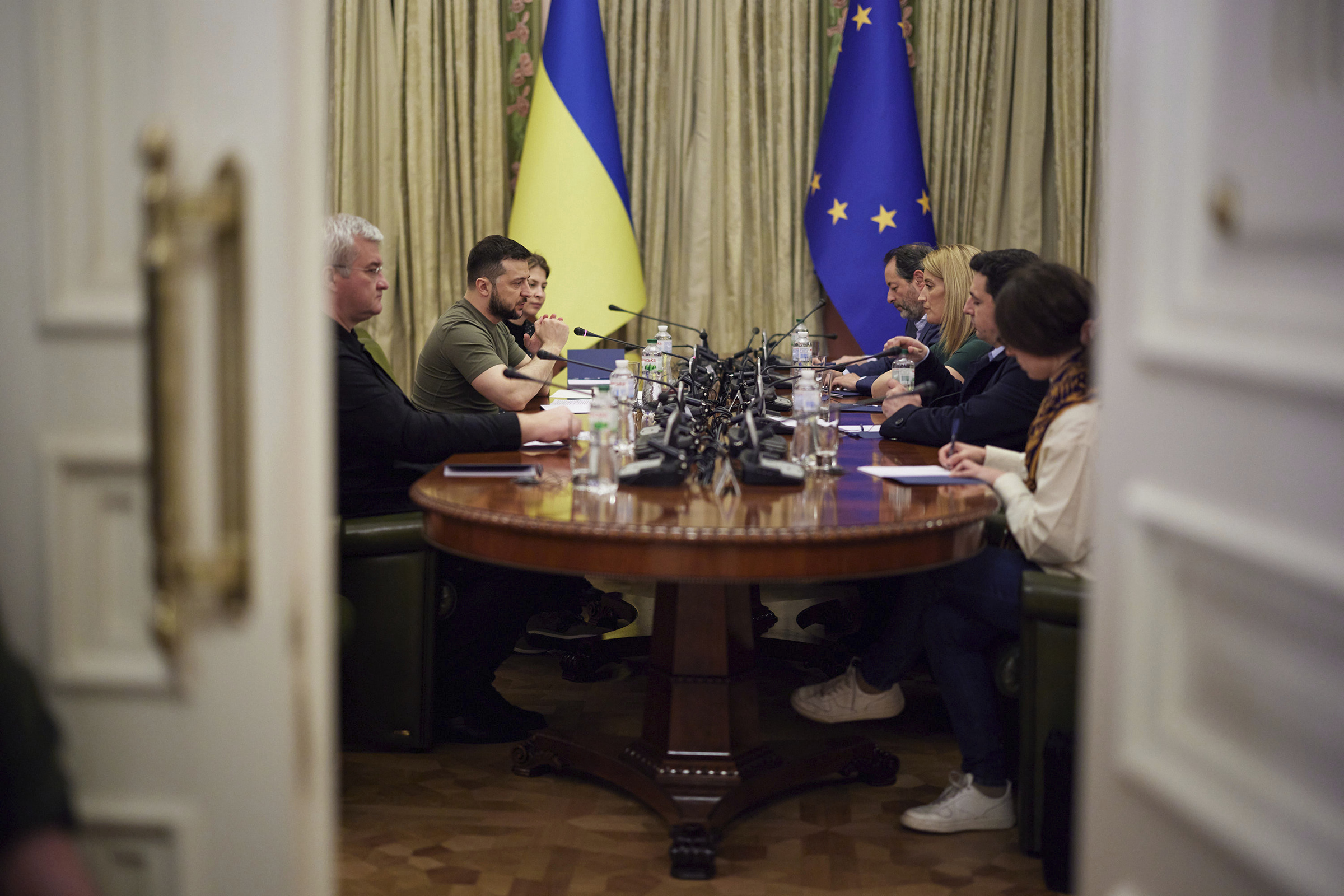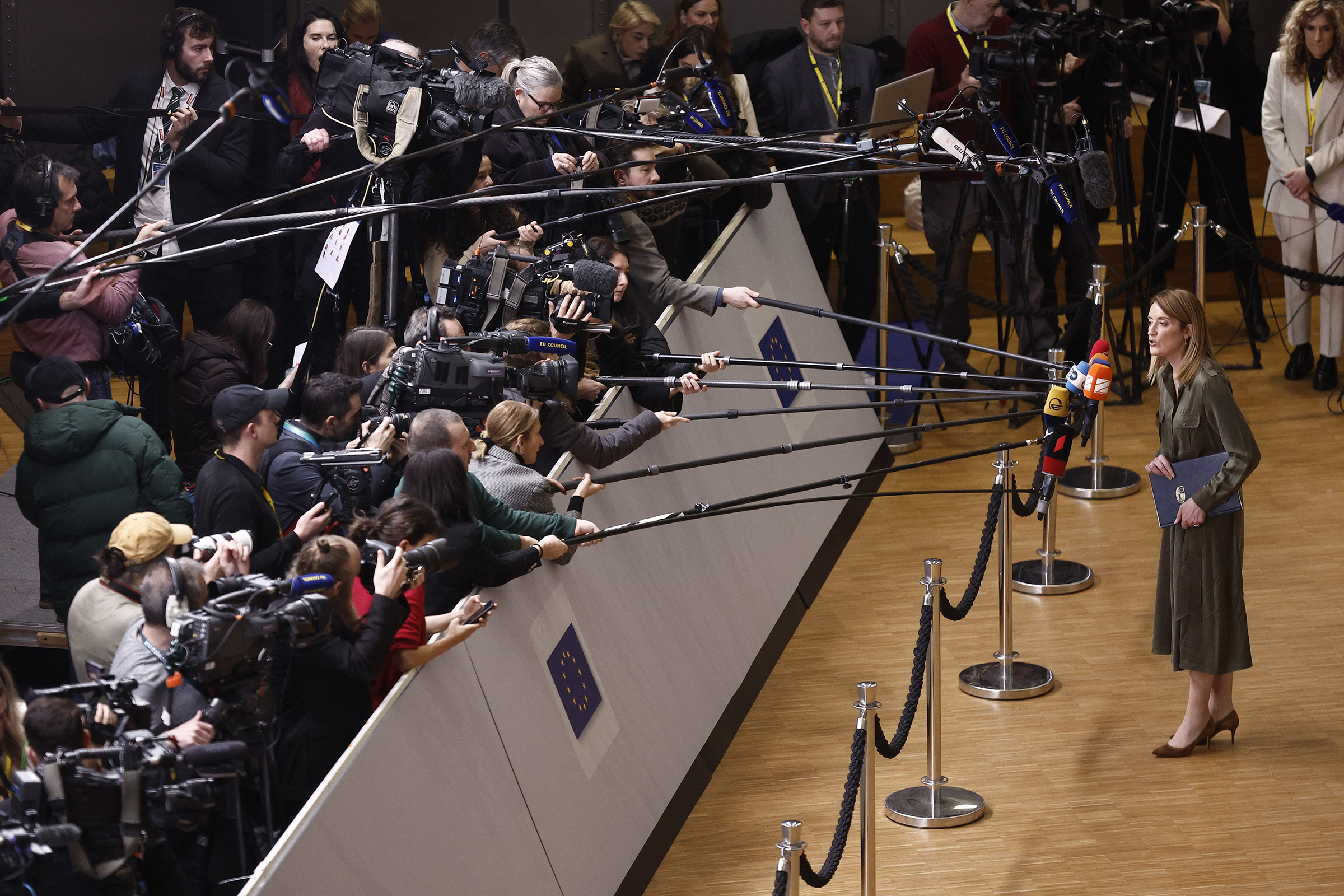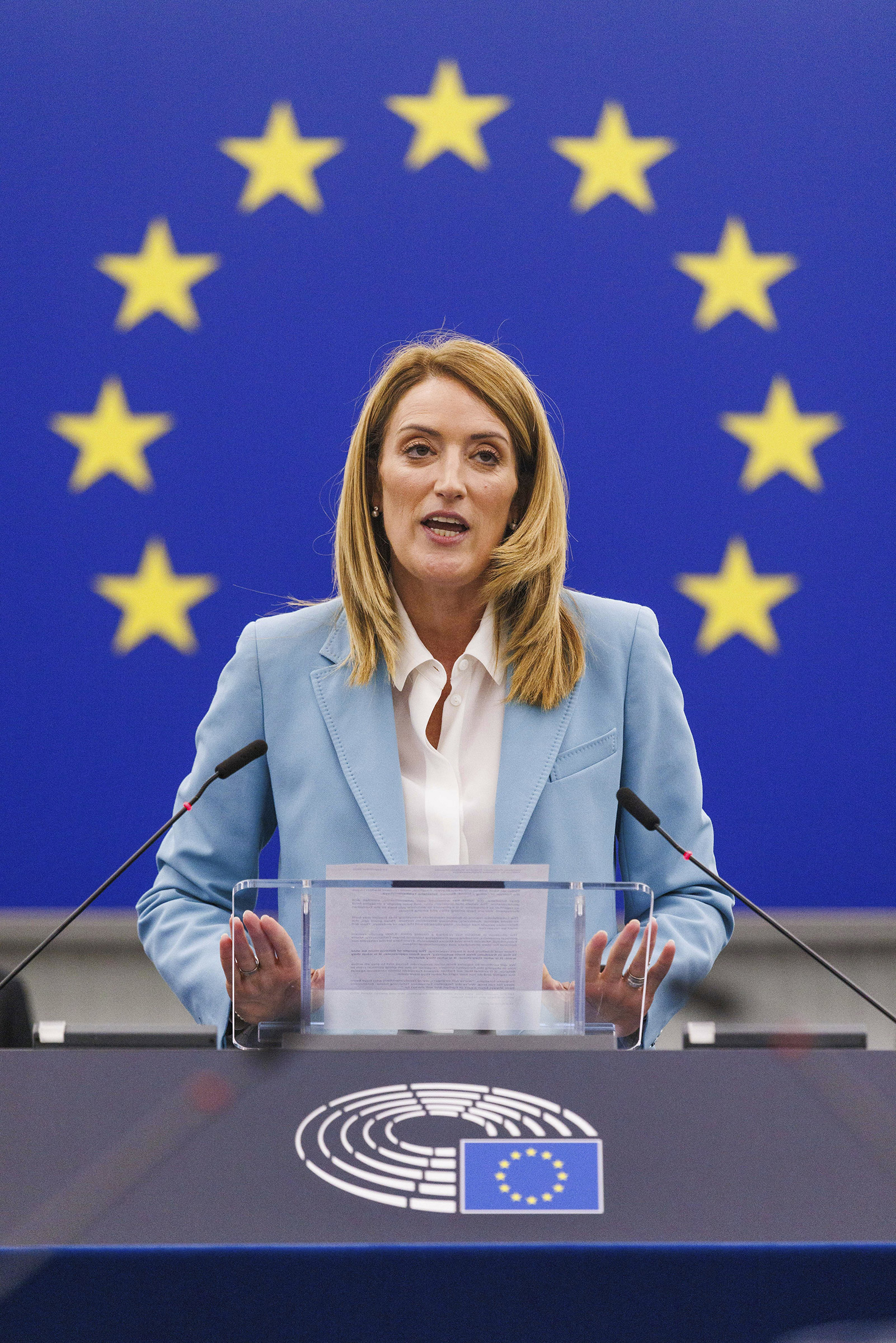Roberta Metsola has plenty of superlatives to her name. She is the youngest ever President of the European Parliament; the first from Malta, the bloc’s smallest country; and the first woman in two decades. But there’s one thing that landed her in the history books that she never expected. On Dec. 10, 2022, Metsola became the first President of the European Parliament to join a police raid against a fellow lawmaker. “It was sad,” Metsola, who turns 45 in January, tells TIME from her office in Brussels. It was like “a punch in the stomach.”
Earlier that day, Belgian authorities had notified Metsola that to comply with local law, she had to join police by 9 p.m. for a raid against lawmaker Marc Tarabella as part of a corruption probe. So Metsola hopped on a three-hour flight from Malta to Brussels, then rushed some 70 miles into the Belgian countryside. With armed police at her side, she knocked at Tarabella’s door with minutes to spare.
The bust happened to come during the FIFA World Cup quarterfinals. “There was France and England playing in a bar next door,” Metsola recalls, “and I just remember hearing the cheers and thinking, Look at what I’m doing.” The coincidence was not a happy one. A day earlier, police began carrying out raids and arrests across Brussels, where the European Parliament does most of its work, amid an investigation into whether World Cup host Qatar had bribed European Parliament officials. Bags of cash totaling some €1.5 million ($1.65 million) were seized during raids in homes and offices in Belgium, Italy, and Greece in the days that followed, in a scandal that ripped through not only the European Parliament but also the E.U. at large. Dubbed Qatargate, it was one of the biggest corruption scandals to hit the bloc in decades.
Metsola, who had campaigned against corruption in Malta and had a reputation as strong on the rule of law, saw the scandal as a threat to the institution and its credibility. “This is something that I could very easily have done nothing about and said, ‘These allegations could have surfaced anywhere. Look at that country … look at the U.S. Congress,’” she says. “But I refused.”
That may be because the European Parliament cannot afford such controversy. Though Metsola has expanded its presence on the world stage—she was the first top E.U. official to travel to Ukraine following Russia’s full-scale invasion—the European Parliament remains far weaker than the E.U.’s executive branch. Its role has traditionally been relegated mostly to amending or adopting E.U. legislation and budgets put forward by the European Commission—helmed by Ursula von der Leyen—based on the political direction and priorities laid out by the European Council, made up of the leaders of the E.U.’s 27 member states.
Metsola wants Europe’s Parliament to have the power its name implies, and generate laws itself. The Qatargate scandal, seized on by prominent Euroskeptic figures like Nigel Farage and Viktor Orbán, did not help. “[People were] saying, ‘Well, all corrupt in the European Parliament, we need to abolish the institution,’” says Daniel Freund, a German Member of the European Parliament (MEP) and outspoken anticorruption advocate. It’s a sore point for a reason. A 2006 internal audit, which the institution tried to suppress, documented abuses, including wildly inflated MEP expenses. Another scandal in 2011 saw four lawmakers agree to accept up to €100,000 ($104,000 at the time) per year from journalists posing as lobbyists in exchange for introducing amendments to E.U. legislation.
Metsola’s response to Qatargate was to announce a 14-point reform plan in January 2023 to tighten anticorruption rules and shore up credibility. That process culminated with a set of amendments to the European Parliament’s Rules of Procedure that took effect in November. Both Metsola and her handlers are keen to emphasize that these reforms are part of a wider pitch to modernize and improve the European Parliament, the only E.U. body that is directly elected by the bloc’s 450 million people. But not everyone is sure the post-Qatargate reforms are enough to stave off future scandals—or whether the bigger job of structural change can get done.

Resting against a spotless window in Metsola’s ninth-floor office, as we spend 45 minutes chatting this past fall, is a framed newspaper clipping from Ireland’s Business Post headlined THE MALTESE BROKER. It’s an apt moniker for a politician who has spent her career balancing the competing demands of Europe’s left and right.
Born in the seaside town of St. Julian’s in 1979, Metsola was only in her early 20s when in 2003 Malta held a tense referendum on whether to join the E.U. A Europhile at heart, she became a campaigner for “yes” in a vote that went 53.65% in favor to 46.35% against, one of the narrowest margins of any E.U. country. Her efforts in the campaign were noticed. The country’s then Prime Minister, Lawrence Gonzi, encouraged her to run for the European Parliament in the 2004 elections. After two failed attempts, in 2013 by-elections she and two others became the first cohort of women MEPs from Malta. “Third time’s a charm,” Metsola says.
Part of Malta’s conservative Nationalist Party, Metsola is a member of the center-right European People’s Party (EPP) in the European Parliament, which has been the largest political grouping for years. Metsola says she’s “right in the center” as someone liberal on social issues (though she has a record of voting against abortion rights) but more conservative on economic matters. It is a political orientation that has allowed her to forge compromise within a sprawling institution made up of seven political groupings with 705 lawmakers from 27 countries.
Such bridge-building proved crucial to passing ethics reforms. The liberal Renew Europe, the third largest political grouping in the European Parliament, resisted reforms. The Socialists and Democrats (S&D), the second largest political grouping, would have too, says Gwendoline Delbos-Corfield, a French MEP with the smaller Greens/European Free Alliance political grouping, who is also part of the 28-member Committee on Constitutional Affairs (AFCO) that steered the reform process. But the socialists ended up taking a different approach given the Dec. 9, 2022, arrest of Eva Kaili, the disgraced and erstwhile S&D Greek MEP at the center of the Qatargate scandal. (Kaili was released in April as the investigation continues.)
Even Metsola’s own EPP was a roadblock to reforms. Rainer Wieland, a Vice President of the European Parliament and a leading party figure on AFCO, argues that the issue of corruption is more down to the political culture of some member states, and is not necessarily something the committee is in a position to curtail. “We have some forces in the House which say, ‘We have to do something because we have to do something,’” he says. “My position on the [Qatargate scandal] is very clear … It’s the business of the criminal [system] outside and not the business of the House.”
And yet Metsola was able to shepherd reluctant MEPs, including from the EPP and Renew Europe, to secure her aims—despite months of what sources say were at times tense and chaotic AFCO meetings. “I’m going to be blunt on this. She was instrumental,” Delbos-Corfield says. Eventually, both AFCO and the Parliament as a whole backed the reforms, with MEPs voting 505 in favor to 93 against in September.
The package has some clear wins for transparency, from a new obligation for lawmakers to declare assets to publishing all meetings with lobbyists. There is now also a ban on accepting gifts above €150 ($164) and a more robust enforcement mechanism, strengthening the parliamentary committee responsible for recommending sanctions when MEPs break rules. (Metsola says she always follows the committee’s recommendations.)
But anticorruption campaigners are critical of the end result. Nick Aiossa, the director of Transparency International’s Brussels office, points to the new requirement to publish more detail about side income above €5,000 ($5,465) as just one example. “By introducing that threshold, they are actually watering down” the existing rules, he says, because MEPs previously had to declare any side income. He adds that though his organization welcomed Metsola’s 14-point proposal in January 2023, he views what came to pass as insufficient. But Aiossa—and everyone TIME spoke to—agreed that Metsola’s commitment to the cause is sincere. “I will credit President Metsola for trying to have her 704 other MEPs be more ambitious with the ethics reforms,” Aiossa says.
When asked what her reforms miss, Metsola says she is watching what comes out of the European Commission’s plan to create an independent ethics body that covers all E.U. institutions. (Von der Leyen had promised in 2019 to back the creation of one; a proposal was belatedly released in June, which was criticized by MEPs and Transparency International because it would lack the power to investigate and sanction.) On the need for a strong and independent ethics body, pro-reform lawmakers agree. But like many of Metsola’s larger ambitions—including strengthening the role of the European Parliament—it may be beyond her control, coming down to the E.U.’s other institutions. “There is huge resistance,” Metsola says. “I’ve been in those meetings.”

Waiting for Metsola outside her office in Brussels, her deputy spokesperson, Antti Timonen, tells TIME that many have characterized the European Parliament under her leadership as like going from a “black-and-white to color TV.” And it’s true that Metsola has won praise from across the political spectrum for her push to take on a more visible public role and to strengthen the institution’s influence within the E.U.
That is apparent when it comes to Ukraine. With at least €132 billion ($144 billion) pledged in aid commitments, the E.U. is by far Ukraine’s largest financial backer. “We decide on that here, together with the European Commission,” Metsola says. She was also an early advocate for Ukraine’s E.U. membership bid, a move she says colleagues across the road in Brussels “were not very happy about.” They would get on board, with Ukraine winning candidate status in June.
One of the European Parliament’s jobs is democratic scrutiny of all E.U. institutions, notably the commission. That’s a realm in which Metsola says she would like to see the Parliament’s powers grow further—including the right to be able to call on all commissioners, at a moment’s notice, to answer to investigation. Metsola is “very optimistic” that such change can be achieved.
But the bid to secure the European Parliament’s right to initiate legislation is a more uphill battle. MEPs have put forward proposals that would overhaul the European Parliament to that effect, as well as considerably increase the number of E.U. decisions agreed to by a vote in the assembly. The changes would require a reform of the E.U. treaties, in what would be a complex constitutional process that involves various institutions. The commission’s von der Leyen has expressed lukewarm support.
For supporters, resistance to such proposals is a shame, given that they could make the bloc more democratic and help tackle transparency and corruption, not least by making MEPs more visible to the public. Attendance is poor compared with national assemblies; some 70% of MEPs have side incomes, and a significant share of lawmakers join lobbying firms when they depart. “For a long time, the European Parliament was seen as a second-class Parliament. Sort of politicians you didn’t want to have in the country anymore and you send them off to Brussels,” Freund says.
The European Parliament could in theory be more akin to the U.S. Congress, the only branch of government that initiates laws; polls show that the public wants it to take on a bigger role. But Metsola may now have more immediate tasks on her radar, like winning re-election when tens of millions of Europeans head to the polls in elections for the next European Parliament in June. Her growing profile because of Ukraine and Qatargate will put her in a strong position to continue to represent Malta, but she’s coy about plans for a second presidential term. “My focus is to get re-elected at home. Then we’ll see,” she says.
After all, when Metsola was first sworn in as President of the European Parliament, she could hardly have anticipated the two events that have defined her tenure. “Somebody asked me on the day of my election, ‘What will you do?’” she says, pointing to priorities like rolling out the E.U.’s COVID-19 recovery package, focusing on the European Green Deal, and pushing to overhaul the bloc’s asylum and migration rules. It was January 2022; Vladimir Putin’s full-scale invasion of Ukraine came a month later, and Qatargate 10 months after that.
But there’s reason to believe the European Parliament’s powers will continue to grow, even if the more sweeping proposals don’t come to pass. A lot has changed since the days when Metsola first got involved in European politics some two decades ago, when the institution’s work was more easily dismissed. “Now, [MEPs] are called legislators, in all areas,” she says. “And if we are not, we fight for it.”
- The 100 Most Influential People of 2024
- How Far Trump Would Go
- Why Maternity Care Is Underpaid
- Scenes From Pro-Palestinian Encampments Across U.S. Universities
- Saving Seconds Is Better Than Hours
- Why Your Breakfast Should Start with a Vegetable
- Welcome to the Golden Age of Ryan Gosling
- Want Weekly Recs on What to Watch, Read, and More? Sign Up for Worth Your Time
